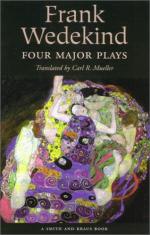|
This section contains 3,709 words (approx. 13 pages at 300 words per page) |

|
Dictionary of Literary Biography on (Benjamin) Frank(lin) Wedekind
From the standpoint of attitudes about women and eroticism, modernist sensibilities can be dated from Jack the Ripper's internationally notorious sex murders in 1888. His widely publicized crimes seized the imagination of all Europe, suddenly thrusting into public view a world that Wilhelmine Germany, like Victorian and Edwardian England, had passed over in silence. In the popular imagination the Ripper soon came to symbolize the demonic claims of sexual instinct, aggression, and domination, the destructive passions that seemed to threaten the orderly conduct of middle-class life. These same themes quickly spanned the geography of literary modernism, from D. H. Lawrence's England to Arthur Schnitzler's Austria-Hungary. In the German theater they are above all associated with the work of Frank Wedekind, whose well-known femme fatale, Lulu, dies horribly at the hands of Jack the Ripper.
In his most enduring works, Frühlings Erwachen (published, 1891; performed, 1906; translated as The Awakening...
|
This section contains 3,709 words (approx. 13 pages at 300 words per page) |

|


